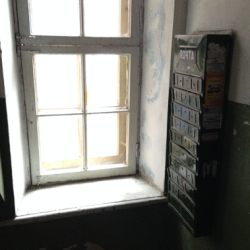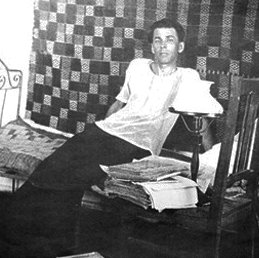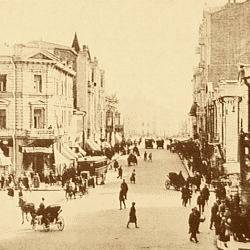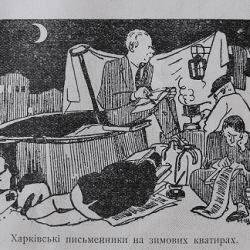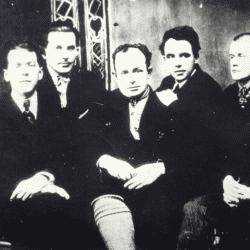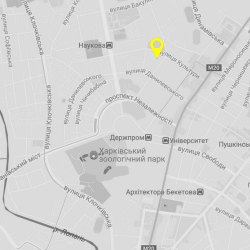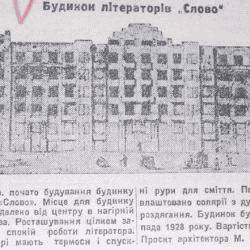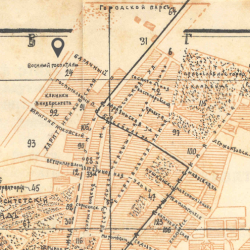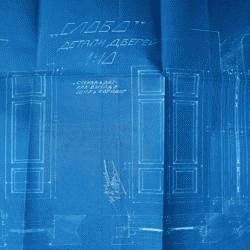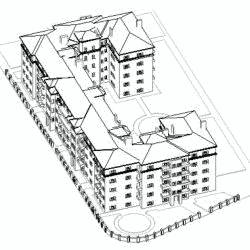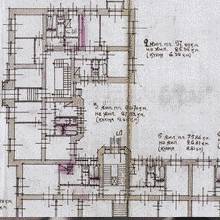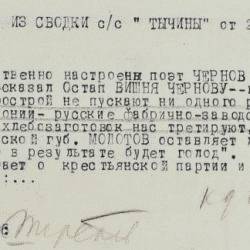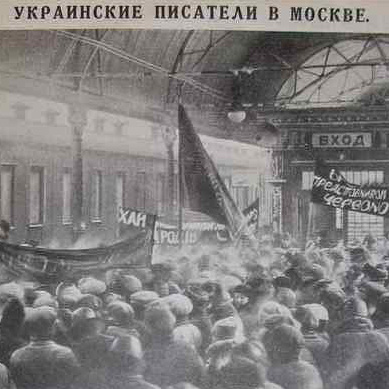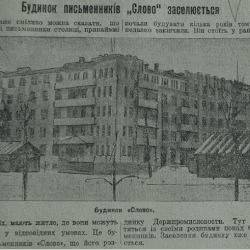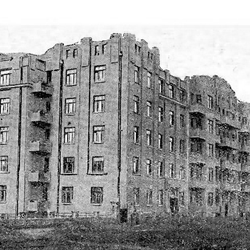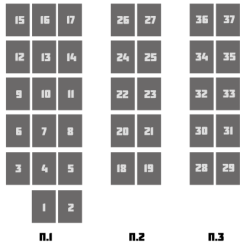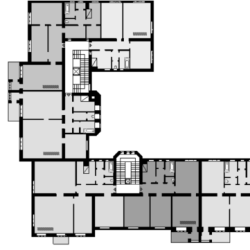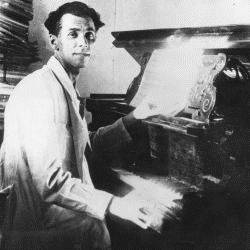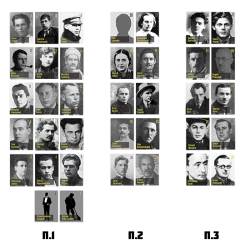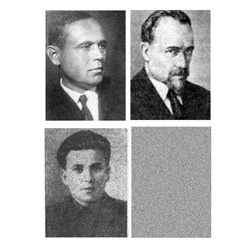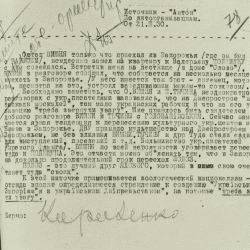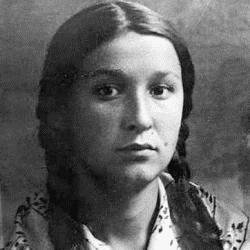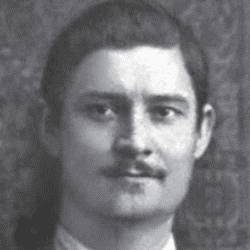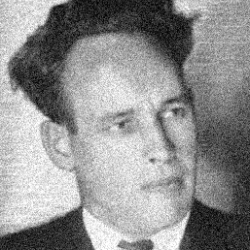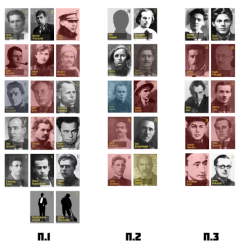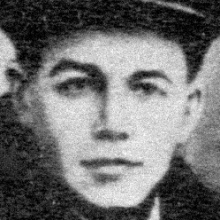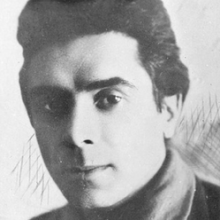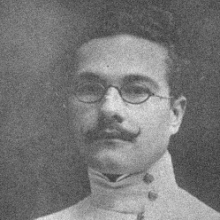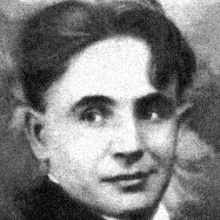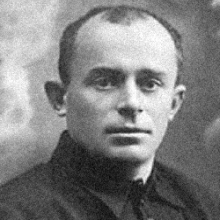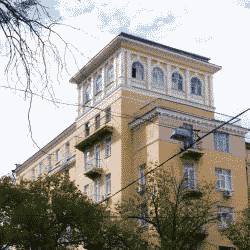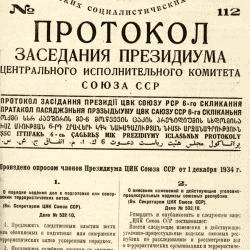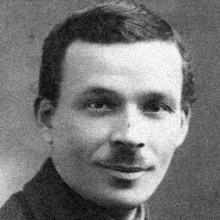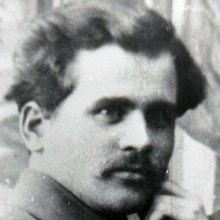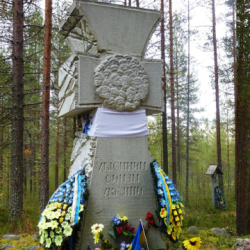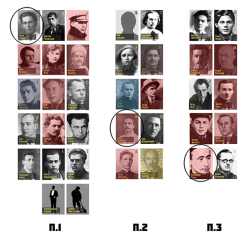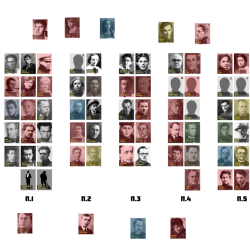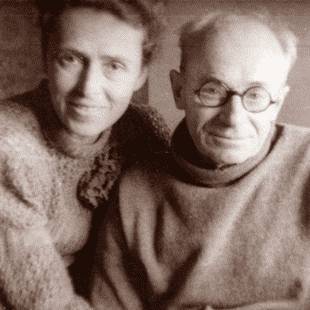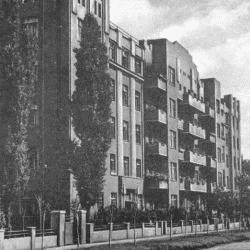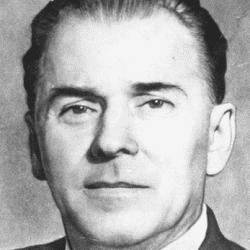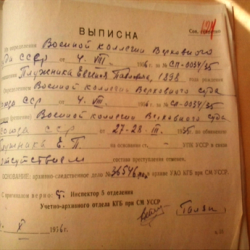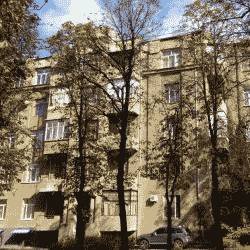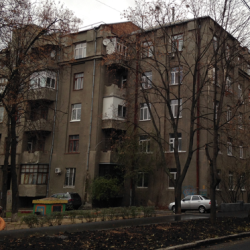Story of Slovo House
From 1923 to nowadays
-
1923
Famous Kyiv poet in Kharkiv? Why?
Pavlo Tychyna moves from Kyiv to Kharkiv to head newly-formed magazine "Chervoniy Shlyash" [meaning "Red Path"]. But salary is not enough to rent an apartment or even a room, so he lives in a nutshell near editorial office's restroom.
-
1923
Cultural burst due to Ukrainization policy
From 1919 to 1934 Kharkiv was the capital of Soviet Ukraine, and he was cultural life bustling. Communist party, trying to become closer to people, to win their favor, announced Ukrainization policy. This facilitated rise in literature and art. Writers had their works published in lots of new periodicals, actively participated in discussions and meetings, joined professional groups. In couple decades, 1920-s were called Red Renaissance. Executed Renaissance, to be true.
-
1923
Writers lived in rather poor conditions
Those who came from villages, little towns and even Kyiv couldn't afford to rent a space to live, since prices in Kharkiv were higher than even Kyiv ones. Salary wasn't enough and it wasn't always paid timely. Men of letters lived and worked in bedsits, 3-meter shells, kitchens, slept right on the floor, newspapers substituting blankets, kept their manuscripts in cooking pots to save it from being eaten by mice and rats.
-
1926
Idea to build a cooperative house
In the middle of 1920-s Ukrainian writers turned to Soviet government with a request to build cooperative building, where would be enough place for everyone. The government supported the project and provided finances. The idea to create such building was born in literary association "Plug" [meaning "Plow"]. Its members formed cooperative society, that was headed by Ostap Vyshnya, his right hand - Serhiy Pylypenko [head of "Plug" himself].
-
September 1927
Project of the House
In September 1927, cooperative signed an agreement with Comungosp to implement the project. According to the documents, Ukrpaistroi performed inner works, the main architectural work was assigned to Mytrofan Dashkevych. Money came from the government, but each writer had to pay first contribution and then pay out the full cost of his apartment during next 15 years. Actually most of habitants didn't have a chance to do that.
Later there came an assumption that Ukrpaistroi contractor installed spying equipment in the house. -
29.9.1927
Newspaper "Visti" informs about start of construction works
Construction of "Slovo" House started the very same year, on September 8-th, not far from center of the city, in the uphill region.
-
29.9.1927
Cozy location
House is being raised in Barachnyi alley [meaning "Barracks"], back then it was suburbs of the city. In 1930-s this alley was renamed as Red Writers Street. But mail sender could sign just "Budynok Slovo, Kharkiv" and all postmen knew where such letter should got to. After WW2 the House has address of "Barachniy, 9" again, a bit later - "Pokrovskogo, 9". Now it is Number 9 on Kultury street [meaning "Culture"].
-
1928
Architectural Project
Architecture M.Dashkevych drafts were quite detailed, everything thougt out - stairs, inner and outer doors, territory around the house, fence. The house was built with best materials available at that time.
5 entrances. 5 floors. 1st, 4th and 5th entrances had also basement floor partly under the ground. 1st and 5th entrances were planned to be equiped with elevators, which were added later (after WW2). Habitants could sunbath at solarium located on the roof of the building. And on the basement floor of entrance 5 there was a kindergarten for writers' kids.
Total number of apartments - 66. Two apartments were meant for house administration - manager and janitor. All the rest belonged to men of letters and art. -
1928
"C"-building
The building has form of "C" letter. In Ukrainian "Слово" [meaning "Word", spells as "Slovo"] starts with same letter. So it was called "Слово" (Slovo) House. And habitants got nickname "slovyans".
-
1928
Luxury apartments for literary elite
Apartments had 3 or 4 rooms. High ceilings, big windows. Largest appartments, corner ones, are around 100 sq. meters. These are the ones taken by the head of cooperative (Vyshnya,Pylypenko).
But at some moment the construction works are delayed, gathered money is insufficient to finish all the works. -
25.1.1928
Denunciations in late 1920-s
Writers are being spied on during all the 1920-s. For example, Ostap Vyshnya took active part in UNR [Ukrainian People's Republic - Ukrainian state formed in 1917 and defeated by the Bolsheviks in 1920]. After its defeat Ostap lives quiet life of nation-wide known humorist. But the government still reckons him to be insecure, so watches him closely. As another example - leading poet Pavlo Tychyna is one of those writing denunciations on his colleges.
-
February 1929
Writers go to Moscow
In February 1929, Moscow holds "Ukrainian week" event during which Ukrainian writers meet Russian colleagues and Josheph Stalin himself. Ostap Vyshnya decides to ask for money right there, he writes a note to leader and receives positive answer. According to fable retold by Stepan Kryzhanivskiy, Vyshnya gots a visit to his hotel room the very same evening and is given a suitcase of money. According to the transcript of meeting with Stalin, Lazar Kaganovych, Stalin's right hand, informs writers that they know about their need of money for the House and that it should be provided.
-
25.12.1929
"Ukrvisti" reports that building is populated
"Now we are free to say that Ukraniain writers, at least most of them, have accommodation, where they can work in proper conditions. That is house of writers "Slovo" construction of which started couple of years ago and finished just recently. It is located not far from Derzhprom building [the Palace of Industry, highest building in Europe in 1928] . More than 60 writers with their families will be placed. The settlement of the house has already begun."
-
1930
At the end of 1929, building is almost ready
Despite the fact that not all utilities are properly set up, writers hurry up to move in before New Year 1930.
-
1930
Allocation of apartments by entrances
66 apartments, 5 entrances, 5 floors + basement floor
-
1930
How apartments were chosen
Head of cooperative and couple of those who took active part in construction process have an opportunity to choose apartments for themselves. All others draw lots. Thus 4-room apartment first goes to one of top writers, Mykola Hvyloviy, but due to quarrels he backs off and decides to go for a 3-room premises.
-
1930
Pavlo Tychyna in living room of his new premises
Now there is enough space for a big library and even for grand piano. Vyshnya, big fan of hunting, gives his dogs whole rooms. Even though some difficulties still occurred such as mice, moth, coal heating,etc., but such living conditions were luxury for that time.
-
1930
First habitants
Most of people in the house had murky past. It has been kept secret lately that during Russian Civil War the whole elite of writers and poets of Soviet Ukraine fought against Bolsheviks under Ukrainian People's Republic flags. Petro Panch and Andriy Golovko were offices in Petlura army, Volodymyr Sosura and Borys Antonenko-Davydovych - reckless junkers, Oleksandr Kopilenko and even 16-year old Yuriy Yanovskiy - volunteer cavalry soldiers. Publc officials of UNR were Pavlo Gubenko(Ostap Vyshnya), Pavlo Tychyna and Yuriy Smolych… At the begining of 1920 part of them found themselves among Borotbists [left-nationalist party] and together with those converted to Bolsheviks. But some of them, for example, Ostapa Vyshnya and, according to some data, Yuriy Yanovskiy, the Reds took as hostages. Though Petlura leaven was still there in them» By historian Yaroslav Tinchenko.
No less was the number of communist ideas fans. One can name Mykola Hvyloviy, Myhailo Yaloviy, Serhiy Pylypenko, Oles' Dosvitniy. And there were purely pro-government writers. -
1930
4 Ivans: Kyrylenko, Mykytenko, Kulik and Le.
Pro-commnunist-party four, three of them living in "Slovo". They formed the VUSPP [All-Ukrainian society of proletarian writers] - literary organization whose task was to publicly criticize "bourgeois-nationalists" and write denunciations against enemies of state. But there were not alone in testifying involuntary or on purpose against others.
-
21.3.1930
Information on Ostap Vyshnya, Valeriyan Polishuk and Pavlo Tychyna
Here agent Anton reports to the authorities in one go about three writers, who supposedly try to create anti-soviet center in Zaporizhya.
-
20.1.1931
Galina Orlivna (Mnevska), apt.27. Actress. The first robin.
She was among first repressed in the house. By that time her first husband was already arrested, later sentenced to death penalty. Galina got 5 years. After end of term she didn't have a right to come back to Ukrainian any more.
-
2.3.1931
Pavlo Hrystuk, apt. 25, Statesman and publicist
As former member of Central Rada [All-Ukrainian council of UNR] and one of founders of Ukrainian Socialist-Revolutionary Party, he probably felt that his position is quite precarious. Thus tried to use words carefully in his publications and wrote ideologically right articles. But having written some positive critiques on Hlyloviy's and Epik's writings, he draws attention of NKVD.
Arrested as a member of "Ukrainian National Center". Accused of belonging to this nonexistent organization were former members of Ukrainian communist party, Ukrainian social-revolutionary party and others, mostly Galicia-born [Western Ukrainian Region]. Sentenced to number of years in the colony. Died in one of Sevvostlag concentration camps. -
16.3.1932
Ivan Bagryaniy, rented room in apt.54. Poet, prosaist and publicist
Accused in "counterrevolutionary agitation using literature works".
Spent 11 month in one-man cell, then got 3 years in Russian Far East camps. Second time he was arrested for "taking part and even leading counterrevolutionary organization". In 1940 charges were withdrawn.
"Please don't call me poet, `cause it insults me deeply. Don't name me poet, my friend, since poets are now the type of criminals, I don't want to belong to."
Poem "Ave Maria", 1927 р. -
1933
In the 1930-s, NKVD comes to most of "Slovo" apartments.
Street doors are blocked under the pretense of residents' security. In the yard, NKVD guys are constantly watching who goes where. During next few years writers are arrested one after another. Cleared appartments are populated with new habitants, also becoming next victims soon afterwards. Great number of appartments have 2-3 repressed residents. Writers are frightened, stop writing or write denials on their previous works, start denounce each others.
-
12.5.1933
Myhailo Yalovyi, apt.30. Poet, prose-writer, playwright, public figure
Accused of espionage and setting up assassination attempt on Pavlo Postyshev [one of main political figures].
From testimony of the prisoner, 07/28/1933: Meeting of VAPLITE core consisting of Epik, Hvyloviy, Dosvitniy, Kulish, Vychnya, Yaloviy, Yanovskiy, Bazhan, Kopylenko, Senchenko, Yogansend and E. Chernyak was held in Epik's apparment of "Slovo" House. [VAPLITE abbr. meaning "Free Academy of Proletarian Literature - literary society headed by M. Hvyloviy] The meeting agreed to: oblige Yaloviy, Dosvitniy and Vyshnya keep permanent contact in task of practical preparations of VAPLITE staff to rebellion in Kharkiv as a center.
Sentenced to 10 years of correctional labor camps. Case was reviewed and sentence was changed to death penalty. Executed on 11/3/1937. -
13.5.1933
Mykola Hvylovyi, apt. 9. One of movers of post-revolutionary Ukrainian prose
The next day after Yaloviy's arrest, Hvyloviy invites Kulish and Dosvitniy [his closest allies] to his appartment. They talk about Yaloviy's case and try to find possible ways to solve the problem. In the middle to conversation, Hvyloviy goes to his work-room, and soon guests hear gun shot sound.
«Arest of Yaloviy is an execution of the whole generation. For what? For being the most sincere communists? I don't understand anything. Long live communism,... Long live commnunist party...», says his suicide note. -
29.11.1933
Serhiy Pylypenko, kv.20. Proseman, fabulist, public figure
Excluded from Communist party "as non-Bolshevik, for distorting national policies and ideological instability", arrested.
February 23, 1934 NKVD troika [ institutional commissions of three persons who issued sentences to people after simplified, speedy investigations and without a full trial] sentenced Pylypenko to death. But according to official documents date of this death is 1943 [as if he died in WW2], and most likely contradicts reality. -
26.12.1933
Les Kurbas, apt. 64. Director, actor, theater teacher, playwright
Was accused of "gloominess", distortion of optimistic Soviet reality, but stage director didn't back-pedal.
After arrest he was forced to write a statement in which admitted his guilt towards society. I declare my total and final disarming in regards to Soviet government and confess in being part of counterrevolutionary organization UVO [abbr. meaning Ukrainian Military Organization].
According to this statement, task of Les Kurbas was On theatrical front, to direct the course of the cultural-artistic process in Ukraine on bourgeois-nationalist rails. Sentenced to 5 years in prison, but in October 1937 sentence is changed to death penalty. -
25.12.1933
Ostap Vyshnya, apt. 22. Most famous humorist-writer of Ukraine
From protocol of Pylypenko's questioning, 12/21/1931:
"...In order to commit terroristic attacks next groups are planned: PYLYPENKO, PANCHENKO, DESNYAK - victim CHUBAR`; Ostap VYSHNYA, DOSVITNIY and SLISARENKO organize assassination attempt on POSTYSHEV ...POSTYSHEV must be killed by Ostap VYSHNYA during the expected reception of Ukrainian writers in Central Committee…"
For some time during interrogations Vyshnya didn't surrender, some say that even tried to joke: "Maybe I should also confess in raping Clara Zetkin?"[German Marxist theorist by 1933 she was 75 years old[,
After investigative tortures had to slander on himself. Spent 10 years in Solovki camps, in 1937 he had a close call, but illness saved him from being in rows of executed. -
May 1934
Capital of Soviet Ukraine is moved from Kharkiv to Kyiv
In May 1934, the capital of Ukraine moved from Kharkiv to Kyiv. By example of Kharkiv writers' house, Kyiv Rolit house was built. [Rolit - abbr., meaning "Workers of literature"]. A number of writers, who belong to the top, had a chance to move to Kyiv location with the hope to be more safe there. But actually it didn't help much.
-
1.12.1934
Assassination of Kirov leads to hectic campaign against terrorism
Right after assassination of Serhiy Kirov [political leader close to J. Stalin] on December 1, 1934, Central Executive Committee issues resolution according to which all hearing of criminal cases are done as quick as possible, accused can be executed the day after verdict is announced
Victims are being tortured so they confess in taking part in non-existent terroristic organizations. One defendant lays information against many others, which whom he supposedly engaged in anti-soviet activity. [There are some assumptions that Stalin was the one who arranged Kirov's murder, due to Kirov being too popular among crowds.] -
December 1934
Mykola Kulish, apt.33. One of most outstanding Ukrainian playwrights
In morning session, Ivan Kulik characterizes Mykola Kulish as an artist who represents nationalism manifestations in drama and "most of plays of which are explicitly nationalistic and hostile to us"
.Soon he is arrest and accused of affiliation to terrorist organization and connections with Ukrainian nationalists, sentenced to 10 years, executed same day as his workmate Les Kurbas. -
5.12.1934
Grygoriy Epic, apt.7. Writers, translator and publicist
After arrest Grygoriy confessed in belonging to mythical terroristic organization, to which supposedly belonged also other 5 habitants of "Budynok Slovo". Wrote repentance letter in which acknowledged that "all of them had to be shot as crazy dogs".
In the exile, writing letters to his wife, tried to show that he was completely remorseful, being full of pathos informs that he created new soviet writings that were very important and whole world should saw. In October 1937, his case was reviewed and he was sentenced to death. -
27.10.1937
Sandarmokh
In camps of Karelia, Sandarmokh, October 27 - November 4 1937, executed are 1111 prisoners to honor 20th anniversary of October revolution. 200+ were Ukrainians, among them "Slovo" writers: Les Kurbas, Mykola Kulish, Grygorih Epik, Andriy Paniv, Mykhailo Yaloviy, Antin Krushelnickiy, his sons Bogdan and Ostap, daughter Volodymyra, Valeryan Polishuk, Valeryan Pidmogylniy. Executed were mostly political prisoners, intellectuals.
-
1941
Repressed are also those who were on the government's side
Those who just recently fought with enemies of state become enemies themselves - Ivan Lakiza, Samiylo Shupak, Volodymyr Koryak and many others. Some though manage to сheat death and do well adjusting to requirements from above (for example, Pavlo Tychyna, Volodymyr Sosura, Yuriy Smolych).
-
1941
Sad statistics
Wave of repressions hit 40 out of 66 apartments Number of executed - 33, sentenced to long term and returned - 3, sentenced to long term and died in a colony - 2, suicide - 1, killed/died under unclear circumstances - 1.
-
1943
Ostap Vyshnya returns after 10 years of exile
He lives in Rolit building and is still being spied on by government agents. Though last reports state that Vyshnya no longer poses a threat to Soviet regime and is ill and weak person. He writes "Samostiyna Dirka" [meaning "Independent Hole"] in which criticizes Ukrainian nationalists and also involuntary jokes about his exile as if in reality he wasn't repressed at all.
And lives Ostap Vyshnya in heaven, plays cards, eats warty-cabbage.
That is a true truth about real Ostap Vyshnya.
* * *
And who is that Ostap Vyshnya, who writes something in Soviet newspapers?
Well, clearly that is Soviet fake. -
1945
Slovo House after WW2
After Kharkov's liberation, while Kyiv was still occupied, Kharkov becomes a place where war-time cultural life starts burst to again. Ukrainian writers return from evacuation, settle in almost empty house and are back to publishing work. But as soon as Kyiv is freed, most important figures head there.
After WW2, in 1945 house is empty again. Old residents recall that anybody could freely pick an apartment for oneself. During war the building wasn't damaged and stays in almost the same state as in the 1930-s. But later in 1950s-60s, due to arson solarium terraces burn down.
In 1950-s house is populated again with young writers of new generation. Also quite a few of painters and sculptors live here. -
1950
Ukrainian writers after WW2
Palvo Tychyna becomes leading Soviet Ukrainian poet and public figure, minister of eduction and deputy chairman. In 1941 he is awardee of Stalin's honor [top honor given in USSR], in 1962 gets Shevchenko's honor, Hero of Socialist Labour in 1967.
-
1955
Soviet government acknowledges that it was wrong about terrorists
Most of repressed were rehabilitated in 1950s on request of relatives. For the sake of rehabilitation, investigation called in for questioning the same people who denounced in 1930s. New testimonies were completely opposite: convicts were never found to have anti-soviet views and were all in all honest communists, leave alone engaging in terrorism.
From the interrogation protocol of witness Pavel Gubenko (Ostap Vyshnya), 7/7/1955:
Question: Do you know Dosvitniy Oles Fedorovych?
Answer: Yes, I know him... I don't know about mistakes of Dosvitniy. I considered him to be good Communist party member, who was on the right tack. -
2016
Nowadays
Nowadays "Slovo" House is located almost in the very center of the city. It is number 9 on Kultury Street. On its other side - Literaturna str. [meaning Literary], which got its name in 2016 due to decommunization process in Ukraine. Before that it was called Yaroslava Galana Street [pro-Soviet writer who didn't live in the House, only visited couple of times. He was murdered in 1949, official Soviet version - killed by Ukrainian nationalists].
-
2016
Slovo House, September 2016
Most of current habitants don't have any relation to families of writers. Now it is regular residential house.
-
2016
November 2016
Current appearance of the house - plastic balconies, rundown walls, bricks falling out.
-
